I am trying to solve an issue with my Jetty servlet running over HTTPS.
This is an error in the browser:
This is an error in the curl:
What I did:
I created my Keystore and Truststore as is described here: How to generate keystore and truststore and here https://serverfault.com/questions/488003/keytool-subjectalternativename
This is my batch script to create Keystore and Truststore:
keytool -keystore keystore.jks -storepass P4ssW0rd -keypass P4ssW0rd -genkey -alias example -validity 365 -dname "CN=example,OU=Example,O=Example,L=Bratislava,ST=Slovakia,C=SK" -ext "SAN=DNS:example.com,DNS:www.example.com,DNS:test.example.com"
"C:\Program Files\Git\usr\bin\openssl.exe" req -new -x509 -subj "/C=SK/ST=Slovakia/L=Bratislava/O=Example/OU=Example/CN=Root-CA" -keyout ca-key -out ca-cert -days 365 -passout pass:P4ssW0rd
keytool -keystore truststore.jks -storepass P4ssW0rd -import -alias ca-root -file ca-cert -noprompt
keytool -keystore keystore.jks -storepass P4ssW0rd -certreq -alias exmaple -file cert-file
echo [SAN] > extFile
echo subjectAltName=DNS:example.com,DNS:www.example.com,DNS:test.example.com >> extFile
"C:\Program Files\Git\usr\bin\openssl.exe" x509 -req -CA ca-cert -CAkey ca-key -in cert-file -out test.pem -days 365 -CAcreateserial -passin pass:P4ssW0rd -extensions SAN -extfile extFile
keytool -keystore keystore.jks -storepass P4ssW0rd -import -alias ca-root -file ca-cert -noprompt
keytool -keystore keystore.jks -storepass P4ssW0rd -import -alias metahost -file test.pem
pause
- keystore.jks and truststore.jks were copied to the directory of my project and code was written up to load these files.
package sk.cood.metahost.server;
import jakarta.servlet.ServletException;
import jakarta.servlet.annotation.WebServlet;
import jakarta.servlet.http.HttpServlet;
import jakarta.servlet.http.HttpServletRequest;
import jakarta.servlet.http.HttpServletResponse;
import org.eclipse.jetty.server.*;
import org.eclipse.jetty.servlet.ServletContextHandler;
import org.eclipse.jetty.servlet.ServletHolder;
import org.eclipse.jetty.util.ssl.SslContextFactory;
import java.io.*;
@WebServlet(displayName = "MetaHostServlet", urlPatterns = { "/*" })
public class MetaHostServlet extends HttpServlet {
private static File keyStoreFile;
private static File trustStoreFile;
public static void main(String[] args) throws Exception {
loadKeyStores();
Server server = new Server(443);
ServerConnector connector = createSSLConnector(server, "P4ssW0rd", "P4ssW0rd", false);
server.addConnector(connector);
ServletContextHandler context = new ServletContextHandler(ServletContextHandler.SESSIONS);
context.addServlet(new ServletHolder(new MetaHostServlet()),"/*");
context.setContextPath("/");
server.setHandler(context);
server.start();
server.join();
}
private static void loadKeyStores() {
keyStoreFile = new File("keystore.jks");
trustStoreFile = new File("truststore.jks");
if (!keyStoreFile.exists()) {
throw new RuntimeException("Key store file does not exist on path '"+keyStoreFile.getAbsolutePath()+"'");
}
if (!trustStoreFile.exists()) {
throw new RuntimeException("Trust store file does not exist on path '"+trustStoreFile.getAbsolutePath()+"'");
}
}
private static ServerConnector createSSLConnector(Server server, String keyStorePassword, String trustStorePassword, boolean isClientAuthNeeded) {
SslContextFactory.Server sslContextFactory = new SslContextFactory.Server();
sslContextFactory.setKeyStorePath(keyStoreFile.getAbsolutePath());
sslContextFactory.setKeyStorePassword(keyStorePassword);
sslContextFactory.setTrustStorePath(trustStoreFile.getAbsolutePath());
sslContextFactory.setTrustStorePassword(trustStorePassword);
sslContextFactory.setNeedClientAuth(isClientAuthNeeded);
HttpConfiguration https_config = new HttpConfiguration();
https_config.setSendServerVersion(false);
https_config.setRequestHeaderSize(512 * 1024);
https_config.setResponseHeaderSize(512 * 1024);
SecureRequestCustomizer src = new SecureRequestCustomizer();
https_config.addCustomizer(src);
return new ServerConnector(server, sslContextFactory, new HttpConnectionFactory(https_config));
}
@Override
public void doGet(HttpServletRequest req, HttpServletResponse res) throws IOException, ServletException {
res.setContentType("text/html");
res.setStatus(HttpServletResponse.SC_OK);
res.getWriter().println("<h1>Hello World!</h1>");
res.getWriter().println("session=" + req.getSession(true).getId());
}
}
- I started my servlet with jetty and tried to connect to https://example.com/ and mentioned error appears.
I don't know what is wrong in my case, maybe someone more experienced with jetty and certificates will help.
Thank you so much!

